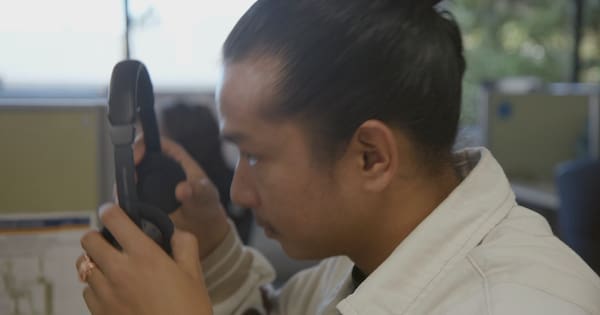A new government-funded training programme in Ōamaru is helping Pasifika factory workers future-proof their careers, as economic uncertainty continues to impact the primary industries.
The free NZQA-accredited course, known as Project Fetu, was designed to upskill workers in literacy, numeracy, and digital skills — areas many have had limited access to as they headed straight into the workforce.
Among the trainees is Salesi Kava, a father of six who left school to support his family after his father suffered a heart attack.
“I didn’t get the opportunity to study like at Polytech or university,” he told 1News.
“I had to drop out and go to work in a factory to get money for the family.”
Kava was one of several workers attending classes after long shifts at nearby meatworks and carpet factories.
The aim of the programme was to gain qualifications that could help secure future employment if local jobs were cut.
Last year, the Alliance meatworks in nearby Timaru closed, leaving 600 people out of work.
Similar closures in rural towns including Waipukurau and Dannevirke had lasting impacts on local communities.
Mata’aga Hana Fanene-Taiti from the Oamaru Pacific Island Trust said seasonal work and visa restrictions add further pressure.

“We have Pacific members of our community that are on work visas. That has a significant impact in terms of them being able to last and withstand the whole off-season period—and it could be months.”
Project Fetu hoped to prepare Pasifika for roles in manufacturing, engineering, and logistics — sectors expected to grow.
Tutors were being flown in from Auckland to cater specifically to learners from Samoa, Tonga, and Tuvalu.
Many of the participants have never used a computer at work and were now learning how to navigate emails and digital payslips.
Nia Bartley from the Council of Trade Unions Komiti Pasifika said the course was helping bridge educational gaps.

“Wherever they’ve come from, the education system they may have embraced may have been limited compared to someone born and raised in a Western nation like Aotearoa,” she said.
Fred Luatua from the Hanga-Aro-Rau Workforce Development Council said technology was also rapidly changing the workplace.
“Some of our workers are experiencing a shift from paper payslips to digital ones and having to open up an email — something they’ve never done before,” he said.
If successful, the pilot programme could be rolled out to other regions across the country.












